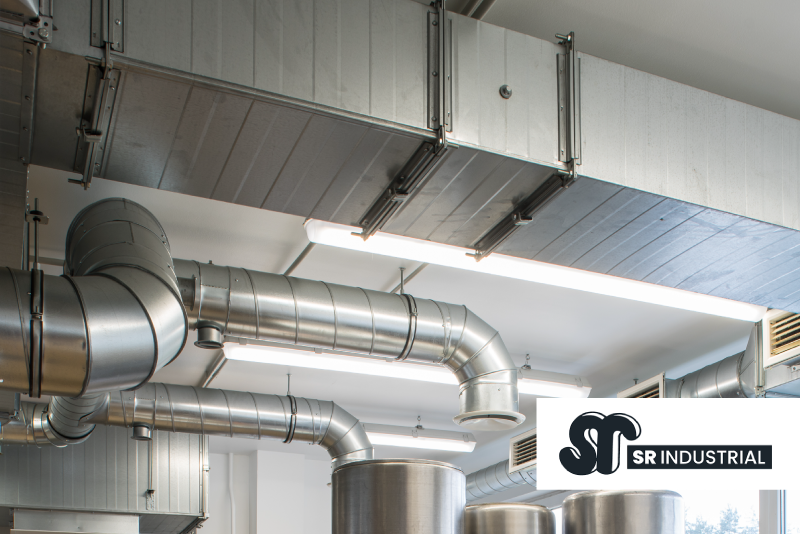The Importance of Commercial HVAC Systems: A Guide for Businesses

Introduction
In today’s fast-paced business world, maintaining a comfortable and productive working environment is crucial for the success of any company. One key aspect that contributes significantly to the overall comfort and well-being of employees is the commercial HVAC system. In this comprehensive guide, we will explore the importance of commercial HVAC systems and how they can benefit businesses of all sizes.
What is Commercial HVAC?
Commercial HVAC, which stands for Heating, Ventilation, and Air Conditioning, refers to the system responsible for controlling and regulating the indoor environment of commercial buildings such as offices, retail stores, restaurants, and hotels. It encompasses various components, including heating equipment, air conditioning units, ventilation systems, and ductwork.
Importance of Commercial HVAC Systems
Commercial HVAC systems play a critical role in creating a conducive work environment that promotes productivity, comfort, and well-being. Let’s delve deeper into the key reasons why these systems are of utmost importance for businesses.
Benefits of Commercial HVAC Systems
Improved Indoor Air Quality With Commercial HVAC
Filtering and Ventilation
Proper filtration and ventilation are essential for maintaining optimal indoor air quality. Commercial HVAC systems incorporate air filters that remove pollutants, allergens, and contaminants from the air, ensuring a healthier and cleaner environment for employees and customers.
Reduction of Airborne Contaminants
Commercial buildings are susceptible to the accumulation of airborne contaminants such as dust, mould spores, and volatile organic compounds (VOCs). A well-designed HVAC system helps minimise these contaminants, reducing the risk of respiratory issues and allergies among occupants.
Creating A Comfortable Working Environment With Commercial HVAC
Temperature Control
A properly functioning commercial HVAC system provides precise temperature control, ensuring a comfortable working environment throughout the year. Employees can focus on their tasks without the distractions of extreme heat or cold, leading to increased productivity and job satisfaction.
Humidity Control
Maintaining an optimal humidity level is crucial for comfort and health. Commercial HVAC systems regulate humidity, preventing excessive moisture that can lead to mould growth or dry air that causes discomfort and respiratory problems.
Air Distribution
Proper air distribution is vital for eliminating hot or cold spots in commercial spaces. HVAC systems distribute conditioned air evenly, ensuring a consistent temperature throughout the building, irrespective of its size or layout.
Commercial HVAC Energy Efficiency
Proper Insulation
Commercial HVAC systems work in tandem with proper insulation to minimise energy wastage. Insulated buildings retain conditioned air, reducing the workload on HVAC equipment and resulting in energy savings.
High-Efficiency Equipment
Investing in high-efficiency HVAC equipment can significantly reduce energy consumption. Energy-efficient systems use advanced technologies, such as variable speed motors and smart controls, optimising energy usage and lowering utility bills.
Zoning and Programmable Thermostats
Implementing zoning and programmable thermostats allows businesses to customise temperature settings based on different areas and schedules. This flexibility improves energy efficiency by only conditioning occupied spaces, reducing energy waste.
The Impact of Commercial HVAC on Productivity
Employee Comfort and Performance
A comfortable work environment created by an efficient HVAC system enhances employee comfort, leading to increased focus, productivity, and job satisfaction. Employees are less likely to be distracted by discomfort, enabling them to perform at their best.
Reduced Sick Leaves and Absenteeism
Commercial HVAC systems that maintain good indoor air quality help reduce the spread of airborne illnesses and allergens. By minimising the risk of respiratory issues and allergies, businesses can experience a decrease in sick leaves and absenteeism, ensuring smoother operations.
Commercial HVAC Equipment Performance and Maintenance
HVAC systems not only regulate the indoor climate for occupants but also contribute to the longevity and performance of equipment. Proper temperature and humidity control ensure that sensitive equipment, such as servers, computers, and manufacturing machinery, operate efficiently and are less prone to malfunctions or damage caused by extreme temperatures or humidity fluctuations.
Factors to Consider when Choosing a Commercial HVAC System
Size and Capacity
Selecting the right size and capacity for an industrial HVAC system is crucial. Undersized systems may struggle to meet the cooling or heating demands of the building, leading to inefficiency and increased wear and tear. Oversized systems, on the other hand, can result in short cycling, poor humidity control, and unnecessary energy consumption.
Energy Efficiency Ratings
When evaluating commercial HVAC systems, pay attention to energy efficiency ratings. Look for systems with high Seasonal Energy Efficiency Ratio (SEER) and Energy Efficiency Ratio (EER) ratings. Higher ratings indicate better energy performance and potential cost savings in the long run.
Installation and Maintenance Requirements
Consider the installation and maintenance requirements of different HVAC systems. Some systems may require specific infrastructure or ductwork modifications, while others may need regular maintenance and filter replacements. Assessing these factors can help businesses plan for the installation and ongoing upkeep of the system.
Budget Considerations
While cost is an important consideration, it’s essential to strike a balance between upfront expenses and long-term benefits. Investing in a reliable and energy-efficient commercial HVAC system may require a higher initial investment but can result in significant energy savings and reduced operating costs over time.
Common Commercial HVAC Systems
Rooftop Units
Rooftop HVAC units are commonly used in commercial buildings, offering space-saving advantages. They consist of packaged heating and cooling components that are placed on the rooftop, eliminating the need for indoor equipment space.
Split Systems
Split systems comprise both indoor and outdoor units. The indoor unit typically houses the evaporator coil and blower, while the outdoor unit contains the condenser coil and compressor. Split systems are versatile and can be configured to meet the specific cooling and heating requirements of different commercial spaces.
Variable Refrigerant Flow (VRF) Systems
VRF systems provide zoned heating and cooling capabilities, allowing for individual temperature control in different areas or rooms. These systems use a refrigerant to transfer heat between indoor and outdoor units, offering energy-efficient operation and precise climate control.
Packaged Heating and Cooling Units
Packaged units combine heating and cooling components into a single unit. They are commonly used in smaller commercial spaces or where space constraints prevent the installation of separate units. Packaged units are efficient, easy to install, and require minimal maintenance.
Chilled Water Systems
Chilled water systems use chilled water as a medium to cool the air. These systems employ a network of pipes to circulate chilled water to air handling units, which then distribute conditioned air throughout the building. Chilled water systems are suitable for larger commercial buildings that require efficient cooling.
Maintaining and Extending the Lifespan of Commercial HVAC Systems
Regular Maintenance
Regular maintenance is crucial for ensuring the longevity and efficiency of commercial HVAC systems. This includes tasks such as inspecting and cleaning coils, checking refrigerant levels, lubricating moving parts, and testing system performance.
Air Filter Replacement
Replacing air filters on a regular basis is vital for maintaining good indoor air quality and preventing clogging that can strain the HVAC system. Clogged filters restrict airflow and increase energy consumption.
Cleaning and Inspecting Coils
Coils in HVAC systems can accumulate dirt and debris over time, affecting their performance. Regular cleaning and inspection of coils help ensure optimal heat transfer and prevent system inefficiencies.
Ductwork Inspection
Leaky ductwork can lead to energy wastage and inefficient airflow distribution. Regular inspections can identify and address ductwork issues such as leaks, gaps, or obstructions. Properly sealed and insulated ductwork ensures efficient air distribution and prevents energy loss.
System Upgrades and Retrofits
Periodically upgrading or retrofitting your commercial HVAC system can improve its performance and energy efficiency. Upgrades may include installing advanced controls, upgrading to more efficient equipment, or incorporating smart technology for enhanced system management.
Finding a Reliable Commercial HVAC Contractor
Research and Referrals
When searching for a commercial HVAC engineer, conduct thorough research and seek referrals from trusted sources. Look for contractors with a proven track record, positive customer reviews, and experience working with commercial clients.
Licensing and Certification
Ensure that the HVAC contractor holds the necessary licenses and certifications required by local authorities. This demonstrates their expertise and compliance with industry standards.
Experience and Expertise
Choose a contractor with extensive experience in commercial HVAC installations, repairs, and maintenance. Commercial HVAC systems are complex, and working with an experienced professional ensures a smooth and efficient process.
Customer Reviews and Testimonials
Read customer reviews and testimonials to gauge the reputation and reliability of the HVAC contractor. Positive feedback from satisfied clients is a strong indicator of their professionalism and quality of service.
Service Agreements and Emergency Support
Consider the availability of service agreements and emergency support. A reputable contractor should offer preventive maintenance plans, prompt response to emergencies, and ongoing support to keep your commercial HVAC system operating optimally.
Conclusion
Commercial HVAC systems are vital for creating a comfortable, productive, and healthy working environment. By providing improved indoor air quality, precise temperature control, energy efficiency, and enhanced productivity, these systems play a crucial role in the success of businesses. When choosing a commercial HVAC system, consider factors such as size, energy efficiency, installation requirements, and budget. Regular maintenance, air filter replacement, and proper system care are essential for extending the lifespan of the system.
Finding a reliable HVAC contractor ensures efficient installation, maintenance, and support for your commercial HVAC needs. Invest in a robust and efficient HVAC system to reap the benefits of a comfortable and productive workplace environment.


